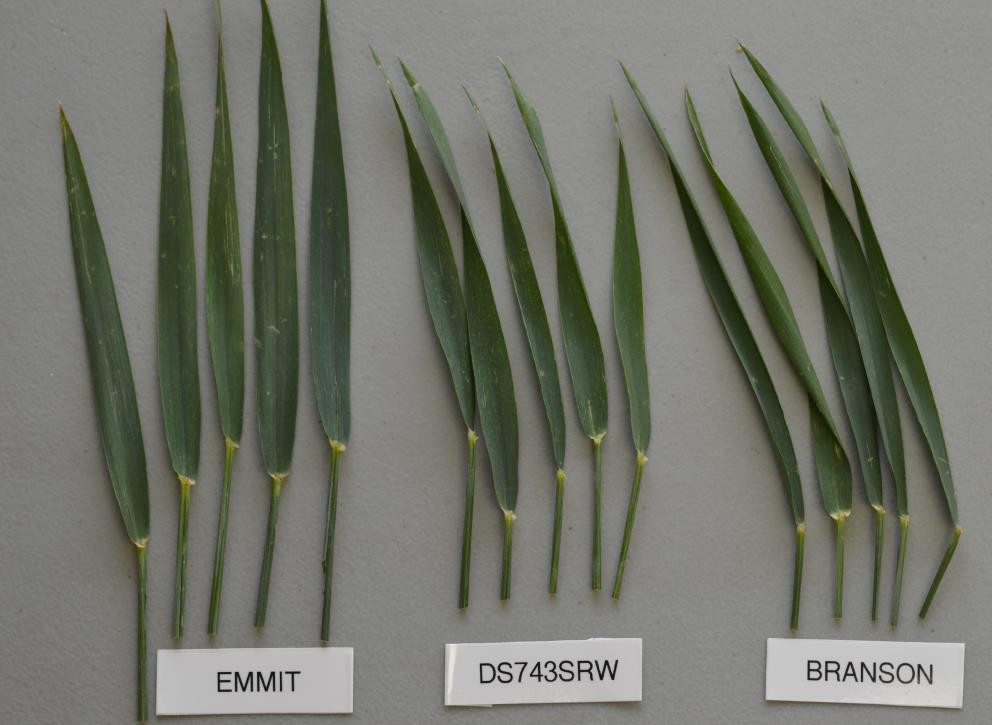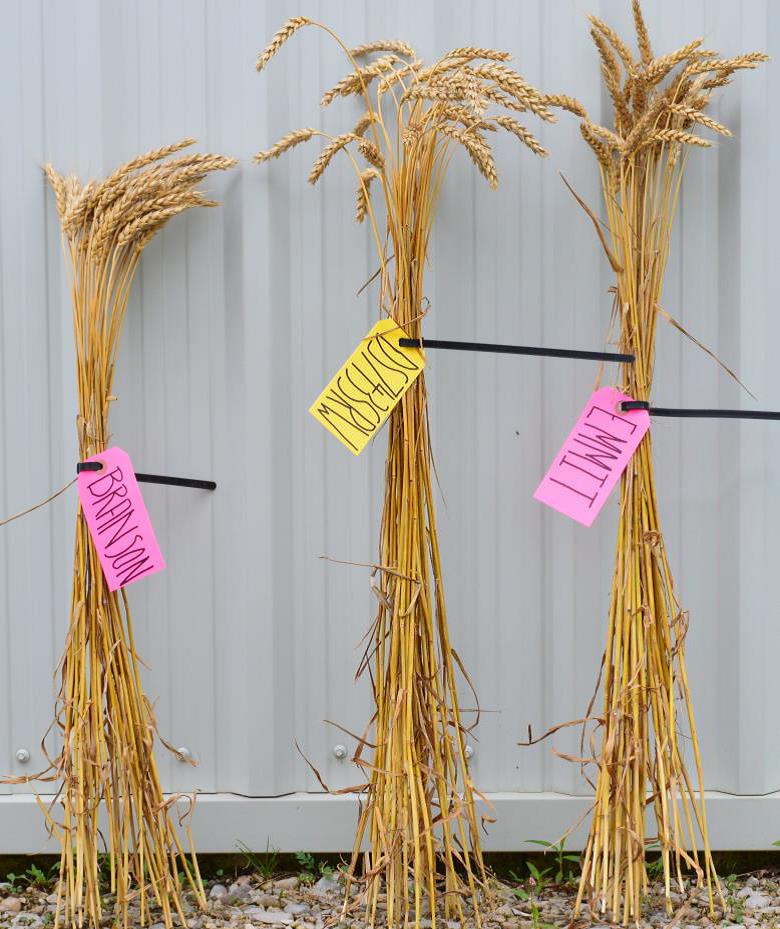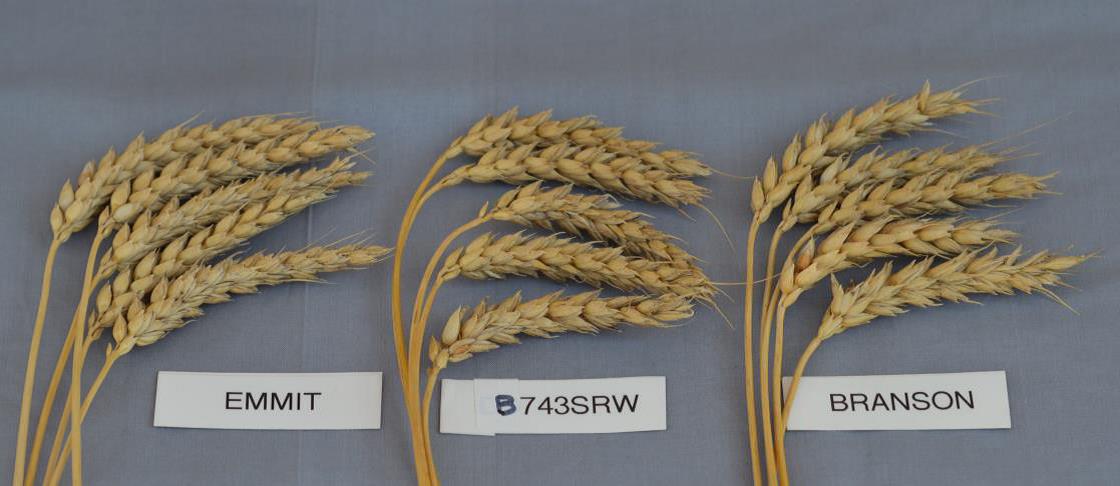B743SRW
| Denomination: | 'B743SRW' |
|---|---|
| Previously Proposed Denomination: | 'DS743SRW' |
| Botanical Name: | Triticum aestivum |
| Applicant/Holder: |
Agrigenetics, Inc. 9330 Zionsville Road Indianapolis, Indiana 46268-1054 United States of America |
| Breeder: |
Mark Etienne, DOW AgroSciences (A Division of Dow AgroSciences, Inc.), St. Mary's, Ontario |
| Agent in Canada: |
Pioneer Hi-Bred Production Co. 240, 115 Quarry Park Road SE Calgary, Alberta T2C 5G9 Canada Tel: 403-440-2988 |
| Application Date: | 2016-04-26 |
| Provisional Protection:: | 2016-04-26 |
| Application Number: | 16-8901 |
| Grant of Rights Date: | 2019-09-13 |
| Certificate Number: | 6064 |
| Grant of Rights Termination Date: | 2039-09-13 |
Variety Description
Varieties used for comparison: 'Emmit' and 'Branson'
Summary: The intensity of anthocyanin colouration of the coleoptile for 'B743SRW' is weak while it is of medium intensity for 'Branson'. The frequency of plants with recurved leaves for 'B743SRW' is medium to high while it is low to medium for 'Emmit'. The flag leaf of 'B743SRW' is shorter than that of both reference varieties. The intensity of anthocyanin colouration on the flag leaf auricle for 'B743SRW' is absent or very weak while it is very strong for 'Branson'. The glaucosity of the flag leaf sheath for 'B743SRW' is medium to strong while it is strong to very strong for 'Emmit'. The plants of 'B743SRW' mature mid-season while the plants of 'Branson' mature early in the season. At maturity, the plants of 'B743SRW' are taller than those of both 'Emmit' and 'Branson'. The spike for 'B743SRW' is shorter than those of both reference varieties. The spike for 'B743SRW' has medium glaucosity while the spike for 'Emmit' has weak glaucosity. The lower glume shoulder shape for 'B743SRW' is straight while it is slightly sloping for 'Emmit' and sloping for 'Branson'. The lower glume for 'B743SRW' has a medium extent of internal hairs while there is a sparse extent of internal hairs for 'Emmit'.
Description:
PLANT: soft red common winter type, erect to semi-erect growth habit at the 5 to 9 tiller stage, medium to high frequency of plants with recurved flag leaves, heads mid to late season, matures mid-season
SEEDLING (4 LEAF STAGE): weak intensity of anthocyanin colouration of coleoptile, pubescent sheaths and blades of lower leaves
FLAG LEAF: absent or very weak intensity of anthocyanin colouration of auricles, medium to strong glaucosity of sheath, pubescent blade, glabrous sheath
CULM NECK: weak glaucosity, curved
STRAW (AT MATURITY): very thin pith in cross-section, anthocyanin colouration present
SPIKE: medium glaucosity at heading, tapering shape in profile, medium density, white at maturity, nodding attitude, absent or very sparse hairiness of convex surface of apical rachis segment
AWNLETS: white, shorter than length of spike
LOWER GLUME: medium width, long, pubescent, medium extent of internal hairs
LOWER GLUME SHOULDER: medium width, straight
LOWER GLUME BEAK: medium length, slightly curved
LOWEST LEMMA: slightly curved beak shape
KERNEL: light red, medium size, short to medium length, medium width, broad elliptical to elliptical shape, angular cheek, short to medium brush hairs, narrow and shallow crease
GERM: medium size, oval shape
AGRONOMIC CHARACTERISTICS: fair to good winter survival, poor bread making quality, good pastry and biscuit quality
DISEASE REACTIONS: resistant to Stem Rust (Puccinia graminis f. sp. tritici), Leaf Rust (Puccina triticina) and BYDV (Barley yellow dwarf virus); moderately resistant to Stripe Rust (Puccinia striiformis) and Fusarium Head Blight (Fusarium graminearum); moderately resistant to moderately susceptible to Powdery Mildew (Blumeria graminis f. sp. tritici) and moderately susceptible to Leaf Septoria (Septoria spp.)
Origin & Breeding History: 'B743SRW' (experimental designations 'DS743SRW', 'DANW1032', 'NC13G-032' and 'TW743-100') originated from the cross 'HW650' / 'WF182-051', made in 2006 at the Nairn Research Station, Ailsa Craig, Ontario. The F1 was developed using the double haploid process. The resulting F1 derived double haploids were planted as a single row from which selections were made based on general appearance and disease reactions. Breeder seed was sourced and multiplied from these selections. 'B743SRW' was further evaluated from 2009 to 2012 for yield and completed two years in the Orthogonal Soft Wheat Registration Trials in the 2012-13 and 2013-14 growing seasons.
Tests & Trials: The comparative trials for 'B743SRW' were conducted during the 2016 and 2017 growing seasons at the Nairn Research Station in Ailsa Craig, Ontario. A four replicate, RCB design was planted with each replicate consisting of 6 rows. The rows were 3 metres long and spaced 18 cm apart. Measured characteristics were based on 25 measurements per variety per year. Mean differences are significant at the 5% probability level based on a paired Student's T-test.
Comparison tables for 'B743SRW' with reference varieties 'Emmit' and 'Branson'
Flag leaf length (cm)
| 'B743SRW' | 'Emmit' | 'Branson' | |
|---|---|---|---|
| mean 2016 | 16.08 | 20.10 | 18.30 |
| std. deviation 2016 | 1.66 | 1.75 | 1.46 |
| mean 2017 | 12.63 | 14.80 | 14.20 |
| std. deviation 2017 | 1.23 | 0.97 | 1.75 |
Plant height at maturity (including awnlets) (cm)
| 'B743SRW' | 'Emmit' | 'Branson' | |
|---|---|---|---|
| mean 2016 | 108.00 | 99.10 | 93.20 |
| std. deviation 2016 | 4.13 | 4.10 | 2.51 |
| mean 2017 | 82.06 | 79.62 | 71.64 |
| std. deviation 2017 | 4.33 | 3.51 | 2.84 |
Spike length (excluding awnlets) (cm)
| 'B743SRW' | 'Emmit' | 'Branson' | |
|---|---|---|---|
| mean 2016 | 7.99 | 8.70 | 8.35 |
| std. deviation 2016 | 0.42 | 0.49 | 0.35 |
| mean 2017 | 7.51 | 8.48 | 7.64 |
| std. deviation 2017 | 0.43 | 0.69 | 0.50 |
Click on image for larger view

Wheat: 'B743SRW' (centre) with reference varieties 'Emmit' (left) and 'Branson' (right)
Click on image for larger view

Wheat: 'B743SRW' (centre) with reference varieties 'Emmit' (right) and 'Branson' (left)
Click on image for larger view

Wheat: 'B743SRW' (centre) with reference varieties 'Emmit' (left) and 'Branson' (right)
- Date modified: